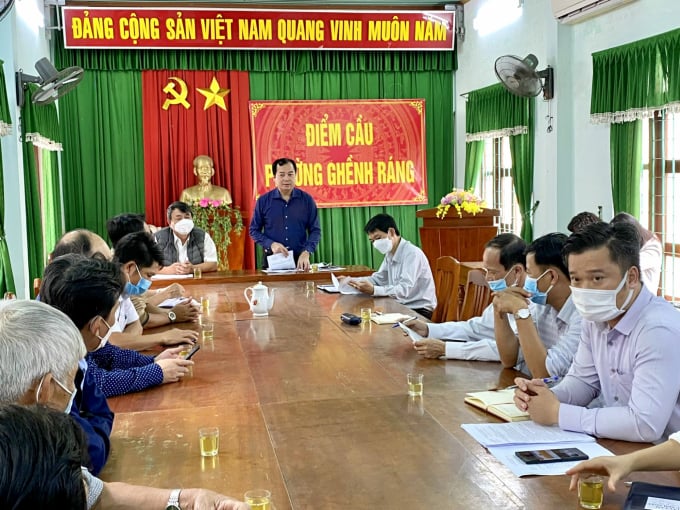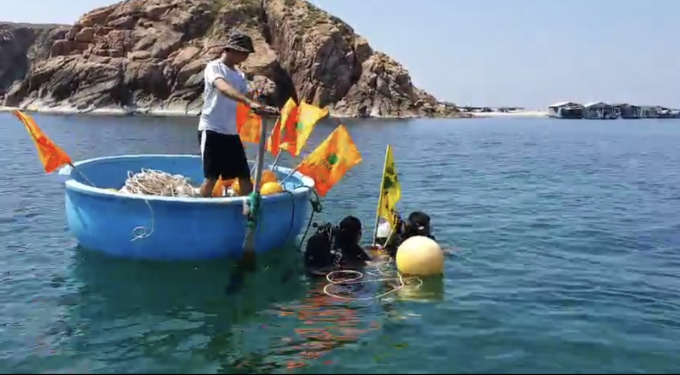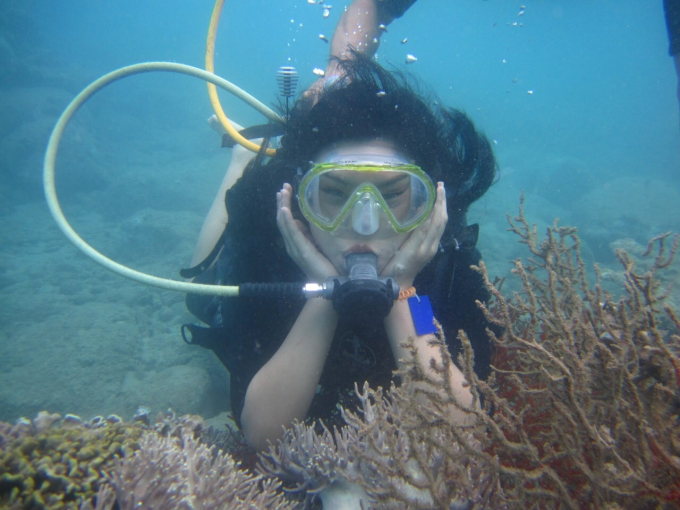June 8, 2025 | 07:49 GMT +7
June 8, 2025 | 07:49 GMT +7
Hotline: 0913.378.918
June 8, 2025 | 07:49 GMT +7
Hotline: 0913.378.918
The Directorate of Fisheries (DoF) has recently worked with Binh Dinh authorities and representatives from the aquatic resources protection community in Quy Nhon Bay to review and assess problems in the co-management of aquatic resources as well as find solutions for the coming time.
A DoF delegation has also worked with representatives of Binh Dinh Fisheries Association, Binh Dinh Fisheries Sub-Department, and 15 members of aquatic resources protection organizations from 4 localities along Quy Nhon Bay including the communes of Nhon Chau, Nhon Ly, Nhon Hai and Ghenh Rang ward of Quy Nhon City.

Mr. Tran Dinh Luan, General Director of the Directorate of Fisheries (standing) works with Binh Dinh authorities on the protection of coral reef ecosystems. Photo: V.D.T.
According to Binh Dinh Sub-Department of Fisheries, with more than 36,000ha of the sea surface, Quy Nhon Bay has favorable conditions for the formation and development of ecosystems, with high biodiversity potentials such as seagrasses, coral reefs, intertidal zones, and adjacent seabeds.
Research by the functional sector shows that Quy Nhon Bay has 720 species of 353 genera and 161 families of 7 organisms main groups along with 152ha of coral reefs distributed along the coast and islands. Around the coral reefs, there are also 16 aquatic breeding grounds, including 3 spawning grounds for squid, spiny snails, and 13 nursery grounds for crabs, lobsters, sea cucumbers, cobia, and grouper...
Since the end of 2018, Binh Dinh has established 11 models of aquatic resources co-management and protection in 20 communes and wards along the lagoon and coastal areas attracting about 500 participants. Among those models, 3 large ones have been established in Tra O lagoon, Northern Thi Nai lagoon, and Quy Nhon Bay.
According to Mr. Nguyen Cong Binh, Deputy Director of the Binh Dinh Fisheries Sub-Department, after the co-management model was implemented, local authorities in coastal areas have paid more attention to aquatic resources management including the elaboration of legal documents and promotion on the implementation of state regulations and community conventions and regulations in aquatic resources management.
The patrol and prevention of illegal fishing have also attracted more attention from authorities. Many illegal actions such as water surface encroachment, illegal aquaculture, and pumping aquatic products have been promptly detected and handled.

Members of the aquatic resources co-management community group in Nhon Hai Commune (Quy Nhon City, Binh Dinh Province) released buoys to protect the core zone. Photo: V.D.T.
“Especially, the fishing community has had a change in awareness with good observance of local rules, conventions and regulations; actively co-operate with local authorities in the protection of the aquatic resource and timely detection of violations," said Mr. Binh.
Representatives from 4 community organizations in 4 communes and wards of Quy Nhon City told the DoF delegation that many good results in co-management have been achieved including those in coral reef ecosystems restoration and Community Fund establishment. However, the representatives also mentioned many unsolvable issues such as those relating to near-shore fishing, in mobilizing public funds from businesses exploiting in the coral protection zone, and most importantly in solving conflicts that occurred in the protected zone.
According to DoF General Director, Mr. Tran Dinh Luan, the implementation of co-management model in aquatic resources exploitation and protection following the 2017 Fisheries Law, in 4 communes and wards of Quy Nhon Bay is very remarkable to recognize, however, to deal with problems there is still quite hard.
Mr. Luan said Binh Dinh needs to raise more awareness of the community, tourists, and state management agencies to join hands in protecting the environment and aquatic resources. In particular, the tourism exploitation in coral reef protection zones in Nhon Ly and Nhon Hai Communes (Quy Nhon City) needs to be strictly controlled to avoid the ecosystem degradation due to overcrowed tourists diving there like what had occurred in Nha Trang City (Khanh Hoa Province).

Tourism exploitation in coral reef areas in Binh Dinh needs to be controlled to avoid the degradation of the ecosystem there due to overcrowded tourists diving. Photo: V.D.T.
Mr. Luan added that Binh Dinh needs to join hands and coordinate with relevant agencies such as the Fisheries Sub-Department and the Provincial Border Guard in handling issues relating to illegal fishing near the shore, at the same time strengthening patrols in areas assigned for performing co-management. The sub-Department of Rural Development and the Binh Dinh Department of Tourism need to coordinate synchronously in performing the task of tourism development associated with marine environment protection in the construciton of new rural areas.
“Supporting community groups to implement co-management is the responsibility of the authorities and Binh Dinh Department of Agriculture and Rural Development. Therefore, when there are problems, the groups should promptly report them to the People's Committees of communes, wards, Quy Nhon City and the Department of Agriculture and Rural Development for support. For setting up public funds, they need to appeal contributions of local businesses, including seafood processing enterprises who have benefited from aquatic resources", Mr. Luan suggested
Translated by Linh Nguyen

(VAN) VAAS and numerous Vietnamese enterprises have signed cooperation agreements with Japanese partners to promote agricultural technology and trade connectivity.
/2025/05/29/5625-12-214801_567.jpg)
(VAN) Provincial mergers in the Mekong Delta promise to streamline administration, expand inter-provincial raw material areas, and foster close linkages in agricultural value chains, benefiting both businesses and cooperatives.

(VAN) Merging Mekong Delta provinces contributes to the expansion of agricultural raw material areas, addressing previous constraints caused by provincial boundaries. Additionally, this expansion will reduce costs and strengthen linkages between businesses, cooperatives, and farmers.
/2025/05/29/1043-2-153730_145.jpg)
(VAN) The Government's policy to merge provincial-level administrative units opens up major opportunities for the Mekong Delta region to reshape its agricultural development strategy toward large-scale production, effective regional linkages, and sustainability.

(VAN) The mutual export of agrifood products between the European Union (EU) and the United Kingdom (UK) must occur again without certification, border controls or other red tape. This was agreed at the UK-EU summit.
/2025/05/22/5121-2-173645_677.jpg)
(VAN) NBSAP Tracker identifies strengths and areas for improvement in the National Biodiversity Strategy, based on each region’s priorities and capacities.

(VAN) The draft amendment to the Circular on rice export trading stipulates a periodic reporting regime for rice exporting enterprises.